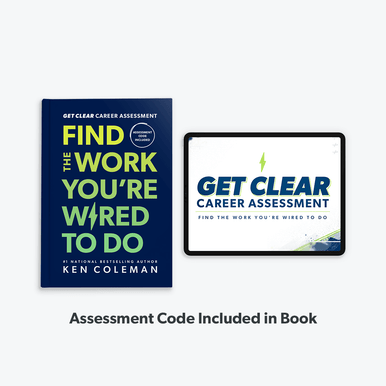What Am I Good At? 10 Questions to Figure It Out
9 Min Read | May 8, 2024

Key Takeaways
- Look for patterns in your work history and school experience that can point toward your strengths.
- People around you will call out your strengths unprompted, so pay attention to compliments and what others ask you for help with.
- If you’re still not sure about your strengths, there are online tools and resources that can help you narrow down your top abilities.
I’m always surprised when people say, “I don’t know what I’m good at.” Especially if they’ve been working in a job where they’re performing well and exceeding the expectations of their role. They were likely hired because of their skills and abilities, and yet they’re not sure where their strengths lie!
Get expert money advice to reach your money goals faster!
Or maybe they’re performing well in their job, but they feel like they’re in the wrong type of work. They might enjoy their job just fine but know there’s something more—so they decide to take a deep dive into understanding and developing their strengths. That way, they can help more people, advance in the company, and ultimately make more money.
Do any of these situations sound familiar? If you want to zero in on your skills so you can grow at work, here’s how to start figuring out what you’re good at.
10 Questions to Help You Figure Out What You’re Good At
If you’re not sure what your top talents are—or you’re asking yourself, “What job should I have?”—here are some questions that can help you narrow down your strongest skills and start doing what you were created to do.
Here's A Tip
Write down your answers to these questions as you go. You’ll start noticing repeated themes that you might not have been aware of before.
1. What were your best subjects or activities in school?
The way we’re wired for work can show up in our early years. Think back to when you were in school, before societal expectations and the pressures of making money drove your decisions. What did you enjoy doing, and who were you? Did you have a flair for the dramatic and excel in theater? Were you on the quiet side but always ready to listen and offer encouragement, making you a student council natural? Maybe you were fascinated by geography and languages—perfect for the hospitality or tourism industries. Reflect on the subjects or activities that came naturally to you and can point you toward your talents.
2. What kind of work comes easily to you?
Whatever the work is, don’t judge the skill it takes or underestimate its value in the workplace. You might think that everyone knows how to write like you do—but that’s simply not true. And I guarantee there are employers out there who need someone with your knack for telling stories or grabbing an audience’s attention through stunning visual art. You might think a particular skill isn’t a hot commodity, but have you considered all the ways that skill could be applied professionally?
3. Where do you get high scores in your performance reviews?
Think back on your most recent performance reviews in your current role. Which of your Key Results Areas (KRAs) or performance markers consistently rank as meeting or exceeding expectations? Your leaders should bring attention to the skills and abilities you excel at. If you’re not sure, start documenting the tasks you complete, people you meet, and project initiatives you suggest that support your KRAs. Then, during your next performance review, you can get your leader’s feedback about those tasks and responsibilities you knocked out of the park.
4. What are your strongest personality traits?
Don’t be humble with this question! Be confident in the strengths you know you have. If you have trouble with this, ask for feedback from your peers and leaders or explore online tests that can point out these traits for you, like my Get Clear Career Assessment.
Asking for feedback can be intimidating, but it’s also an eye-opening way to learn about your strengths. Ask friends, coworkers or other people you trust what they think your three strongest personality traits are—and believe them!
5. Which skill set do you gravitate toward?
Are you better with people, manual labor or data? Skill sets tend to fall into these three areas (though there are other areas, and it’s possible to be good at more than one).
Some people would rather talk to customers on the phone than make a spreadsheet, but for others, picking up the phone is their worst nightmare. One’s not better than the other, so take time to think about which one of these categories—if any—resonates with you.
6. When you’re part of a team project, what role do you take?
Team projects can tell you a lot about your strengths because people naturally fall into responsibilities they’re good at and dynamics they’re comfortable with. Take stock of the past few team projects you’ve done to see if there’s a pattern. Do you volunteer for a behind-the-scenes role, or does your team unanimously select you for a leadership position because they trust you to make good decisions?
Maybe you usually plan and schedule the team meetings, take charge, and give the group a clear vision. Maybe setting goals and creating the timeline is more your speed. When it comes to teamwork, leaning into your strengths to lead others or drive projects past the finish line is a great way to get noticed and promoted.
7. What kind of training or experience do you already have?
Classes, certifications, trainings, internships, freelance work and hobbies all count as experience. Say you were interested in event planning, but you’ve never had any formal education or paid work in that industry before. But you have hosted plenty of dinners, organized retirement parties for coworkers, and planned five years’ worth of birthday parties for your kids. Sounds like experience to me! You could also take a course in event planning and start building a portfolio from there, but you don’t need a degree to prove your talent. You just have to spend time doing it.
8. How do you like to spend your free time?
When you have no responsibilities tugging on your free time, what brings you a sense of purpose and fulfillment? Do you volunteer with kids or animals in your community? Do you enjoy focused, creative activities like photography or woodworking? Pay attention to where your mind (and feet) wander in your free time. If you notice any patterns in the places, people and products you spend time with, those could be clues about environments you belong in and activities you’re good at.
9. What do people need your help with?
Your talents might come so naturally that you simply don’t realize other people aren’t talented or capable in the same way. Start paying attention to what people ask you for help with. Are you the go-to handyman who’s always available to fix a project in a pinch? Maybe your coworkers ask you to preview email copy and resumés because you’re a wordsmith. Rather than comparing yourself to other people and what they’re good at, start honing in on those unique “asks” that only you can help with.
10. Whose work inspires or motivates you?
Think about the professionals whose work you admire and consume. Maybe you subscribe to multiple podcasts hosted by world-class doctors, or maybe you follow lots of internationally recognized interior designers on Instagram. The experts and mentors you take inspiration from probably hold clues about what you’re good at—or what you have the potential to be good at. For example, I admired sports coaches and mass media news personalities when I was younger. Now I coach people on their professional development through bestselling books and shows like The Ramsey Show and The Ken Coleman Show.
Why It’s Important to Know Your Strengths
Leaning into your talents—your personal strengths, learned skills and natural abilities—is a key part of success and development at work. Talents can be hard skills, like writing, coding, math, design or project management, or soft skills, like reliability, collaboration or humor.
Meaningful, fulfilling work happens when you use your talents—what you do best—at work most of the time. We all have responsibilities that aren’t our strong suit (or that aren’t even enjoyable), but a job that really uses your talents will help you make a greater income and impact.
The more you know and understand your own talents and strengths, the more you can develop those skills and become a leader or expert in those areas. Then you’ll be closer to getting promoted or finding new work you’re excited about.
Understand Yourself to Grow at Work
I’m a fan of making lists of all your strengths—that way, you’ll be able to focus on growing those abilities at your current company or filtering through job listings that line up better with what you excel at. This self-awareness is such an important part of moving forward and growing in your current job or finding new, meaningful work.
If this article was helpful and you want a deeper, more personal understanding of your strengths so you can win at work, I’ve got just the thing! My new book, Find the Work You’re Wired to Do (with the Get Clear Career Assessment included!), will get to the heart of who you are and how you’re wired. With this new, detailed self-awareness, you’ll be better able to grow in your work and make more money doing what you enjoy. The assessment has helped thousands of people get clarity on their strengths—and it can help you too.
Get Clear Career Assessment: Find the Work You’re Wired to Do
FAQs
How do I find out what I’m good at?
Reflect on patterns of your school years and working life. Is there any consistency in your roles or interests? Take note of themes that come up again and again.
What if I’m not good at anything?
Nonsense! Everyone is good at something. Keep an open mind, and experiment with different hobbies, read a variety of job descriptions to see what stands out, and don’t be afraid to ask people close to you what they think your strengths are.
What if I’m good at something but don’t enjoy it?
Your work skills might not match your personal passions, and that’s all right. Some people love shredding on a guitar, but they’re not a professional musician. Instead, they’ve got certifications and years of experience as a software engineer. And they’re excellent at their job! If you don’t enjoy what you’re good at, look at learning new skills or taking on different projects that add variety to your work.
Should I be good at something in particular?
There’s no one-size-fits-all approach to developing your skills and improving your strengths. If you want to become a leader in your current company, focus on developing the skills that will help you manage projects and support a team. No matter what your job is, focus on developing skills you enjoy and are directly applicable in the workplace.



